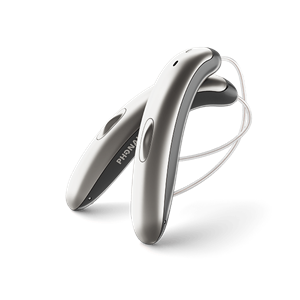What can hearing aids do for tinnitus?

What can hearing aids do for tinnitus?
10 min.
Publication Date: September 24, 2021
If you suffer from tinnitus, you are probably all too familiar with its annoying symptoms. Buzzing and ringing in the ear can be highly disturbing, especially if the sensations persist over a long period. Interestingly, the vast majority of tinnitus sufferers also have some degree of hearing loss.
What is tinnitus?
Tinnitus refers to the phenomenon of perceiving sound in the absence of external noise. While most call this "ringing in the ear," in actuality, the sound that you hear can be different, such as buzzing, clicking, swishing, or whistling.
Tinnitus that lasts only for a short time is acute, while longer-lasting tinnitus is chronic. A Health Measures Survey (CHMS) found that 43% of Canadians aged 16 to 79 had experienced tinnitus during their lifetime. Some experience chronic ringing in the ear, and some experience more debilitating forms of the condition. As a result, your life quality can suffer greatly depending on how long you have been dealing with the annoyance of hearing sounds and how severe your case is.
If the noises and sounds you hear can only be perceived by you, doctors refer to your condition as subjective tinnitus. Ninety-nine percent of tinnitus cases fall into this category. The remaining one percent is referred to as objective tinnitus, where others can also hear the noises.
Unfortunately, there is no cure for tinnitus, but there are treatment options that can reduce your symptoms and make them less burdensome on your life.
What causes tinnitus?
Although it is difficult to say what caused ringing in the ear in your case, here are the leading causes of tinnitus:
- exposure to loud noise (exposure, music, gunshot)
- medication side effect
- age-related hearing loss
- earwax blockage
- neurological disorders
- bone degeneration in the middle ear
- TMJ disorders
- upper respiratory infection, COVID-19, etc.
How is hearing loss connected to tinnitus?
An audiologist is the best person to determine whether you also suffer from hearing loss in addition to tinnitus symptoms. If you have hearing loss, neuroplastic changes occur in the brain, affecting how your brain processes the various frequencies.
Since hearing loss reduces your ability to hear external sounds, this alone can amplify the sounds you hear due to your tinnitus. In addition, having hearing loss - either age-related or other types - and tinnitus simultaneously makes it very challenging to communicate. But don't get discouraged, as hearing aids for tinnitus can be particularly helpful.
How can hearing aids help with tinnitus?
Tinnitus hearing aids can offer significant tinnitus relief. They do so in multiple ways. For instance, hearing aids shift your attention away from the tinnitus sounds by amplifying the external sounds that you hear. Other hearing aids help tinnitus patients by introducing soothing sounds and white noise into the ear. This strategy is called tinnitus masking, and many people find it quite effective. Tinnitus-masking sounds are typically either built into the device or can be programmed with the help of an app.
Habituation is another technique that some hearing aids and sound therapy may use. This exciting method is used to retrain the brain and teach it to classify tinnitus sounds as non-significant. This strategy helps tinnitus patients ignore the annoying tinnitus sounds and focus on sounds generated externally.
To help you choose the best possible hearing aids for tinnitus, here are a few pointers to keep in mind:
Choose a brand that has a positive reputation and one that has built-in technology to offer tinnitus symptom relief. Learn more about hearing aid brands here.
Understand the difference between devices with rechargeable batteries and ones with disposable batteries. Then, choose a hearing aid that suits your needs the best.
Hearing aid for tinnitus come in many shapes ad types. Some people prefer the behind-the-ear models, while others look for in-ear types.
What is the cost of hearing aids for tinnitus?
The cost of hearing aids varies depending on the level of technology and the features you choose. There are many financing options available, including third-party coverage and other benefits. Learn more about the factors that affect the cost of hearing aids https://www.connecthearing.ca/hearing-aids/cost/here.
What are other tinnitus treatment options?
Sound Masking Devices
Sound masking devices are apps or devices that create ambient background noise, white noise, pink noise, or nature sounds. Many people with tinnitus add these devices to their homes to help mask the ringing in the ear, offering a way to relax and temporarily retrieve from the condition.
In the traditional sense, sound masking devices have been table-top or bedside devices with programmed sound options. However, it is important to note that any sound-producing device can be used as a means to mask sounds, such as TV, radio, and even your computer. Ceiling fans are also a great alternative.
The biggest disadvantage of sound masking devices is that they only work during or immediately after use. Unfortunately, they do not offer longer-term tinnitus symptom relief.
First things first, get a hearing test done. Based on the results, your hearing professional will help you determine if getting a hearing aid to relieve your tinnitus symptoms is the most beneficial for you.
The information contained in this article is for educational and informational purposes only. You should not use the information as a substitute for, nor should it replace, professional medical advice. If you have any questions about your health, you should always consult with a physician or other health-care professional.
Author
Connect Hearing Canada



